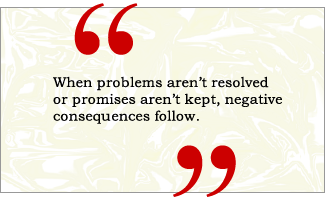The overall health of the brand marriage can be severely affected by problems, whether large or small. We've found that the expressed loyalty of customers who have experienced a problem will typically decline by as much as two-thirds. Problems weaken the customer connection, eroding its foundation and causing buyers or users to doubt your brand's ability to deliver its promised performance.
Problems occur, and customers understand this. But when problems happen, how they are handled is actually much more important to customers than whether they are resolved. Although resolution is obviously important, it's possible for customers to get there without feeling that the company has Integrity. Resolution can be forced, as any tort lawyer will gladly attest -- but dragging a company into court and winning a settlement isn't the way to build customer engagement and goodwill.
Research into problem-handling underscores the potential for relationship recovery even while it highlights the demanding nature of this challenge. Problems handled at excellence can, we've found, actually enhance the customer relationship. In these cases, the company's Integrity is reinforced or even bolstered by evidence of the company's real commitment to its customers. (See "Sorry Seems to Be the Hardest Word" in the "See Also" area on this page.)
However, only about one in seven customer problems are typically handled at excellence, our research reveals. What's more, anything less than excellence appears to be enormously destructive, placing the brand marriage in peril.
On the other hand, where excellence exists in problem handling, the relationship can emerge even stronger. Consider the following story, told by a New Jersey mother of three:
"When one of my children was very young, she would put herself to sleep with a little lullaby toy, and that's how she learned to go to sleep. One night, it just stopped working, and I'm not sure what went wrong or why. I called the company's 800-number on the back of the product. I got a really nice woman who didn't say, 'Well, you know, you need to take it back to the retailer.' Instead, she said, 'I'll ship one out to you today.' There was no charge. She didn't ask me to send back the damaged product. She just took my word for it and sent me a new one. I was really surprised and very pleased."
That's not a typical company response, of course. Contrast that mother's story with the following tale of woe, told by a young mother in the Midwest:
 |
"They said they had a return policy. Well, I had the receipt. I had everything. And I took it back in, and they wouldn't exchange it. They wouldn't even give me anything for it. It was very upsetting because of what they had told me -- the saleslady. I had told her it was a gift, and that I was going to show it to the person, and if I brought it back would they exchange it or refund or give store credit. But when I came back that same salesperson wasn't there, and they wouldn't exchange it. They wouldn't do anything. They just said, 'Well, it's yours now.' I haven't been back since."
When problems aren't resolved or promises aren't kept, negative consequences follow. And even when the promise is eventually -- and perhaps reluctantly -- kept, the consequences are detrimental to the customer's emotional connection to the company. In a survey of the U.S. auto industry, about one in five (21.2%) car buyers said they had a problem with their vehicle recently. Some of these problems were more serious than others, but that wasn't the critical factor; to consumers, anything they say is a problem is something worthy of being addressed.
The customer engagement level of car owners who didn't have any problems was 3.6 times greater than the engagement level of those who did. Even more revealing was the impact of how well these owners' problems were handled. Fewer than one in five people who had a problem (18.4%) were extremely satisfied with how it was handled by the automaker or its dealers. When problems were handled at any level below excellence, customer engagement almost vanished, and the percentage of fully engaged customers sank to only 1.1%. These customers were 25 times less engaged than those who never had a problem.
Our research has revealed similar results in studies of hotels, banks, grocery stores, airlines, and credit cards. Effective problem-handling is key to relationship recovery.